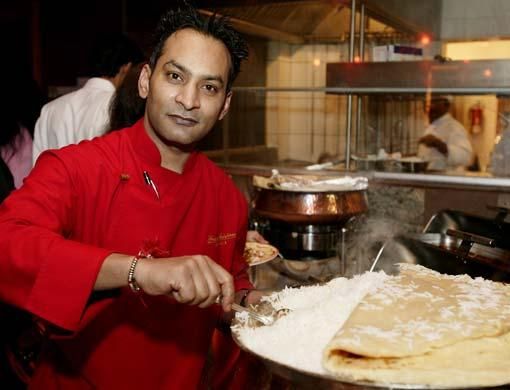When you're in the mood to indulge in something exotic and spicy, what better dish to choose than biryani. In an interview with e+, Chef Mohammed Irfan Qureshi talks about this aromatic dish, his love for food and his family of royal chefs.
Calorie counting is fast becoming a universal obsession, but once in awhile indulging in fare without a care about the lard can be fun. What better than a well-rounded biryani to spice up your weekend? When e+ caught up with Mohammed Irfan Qureshi, the chef who dished out a gastronomic bonanza to mark the opening of his restaurant Qureshi at The Chelsea Hotel in Dubai, he could not help but gush at this aromatic creation.
"We have carried forward the tradition of cooking a Dum Pukht biryani with its essence and flavours intact. And frankly, if you are stripping it off its spices and oil, there is not much to look forward to. So my advice is to enjoy the taste and the flavour," he says.
Sounds like a great plan, especially when it comes from a person who has taken tips from grand master chef Imtiaz Qureshi, his father, who is regarded as a pioneer in popularising Awadh cuisine, once patronised by royalty.
"My father (above) has spent years researching the Dum Pukht biryani style of cooking. So it was only natural that I carried on his legacy. But having said that, I was under no pressure to become a cook myself. But I just loved being in the kitchen. It was my favourite playground," he says.
Some playground this, where the game is all about making biryani out of 600 kgs of rice and 300 kg of meat.
"It was an overwhelming feat. I attempted it during my days with ITC group of hotels in India. I used a 12-foot pot to make it," he says.
Another feather in his chef's cap is the melt-in-your-mouth Kakori Kebab. Legend has it that the dish was made for a toothless king, who found it easy to chew.
Captain Cook
"I come from a family of khandani bawarchis [royal cooks]. But frankly, there was hardly any pressure to keep the tradition going. I knew I wanted to be a chef from childhood," he said, when asked if he had explored other career options.
And what about the pressure of filling his father's shoes? "The recipes of my father are the greatest legacy I have. What more could I have asked for?" he says.
Fair enough. And Qureshi is not the only one pleased with his father's recipes.
We too, who were at the launch of the restaurant, dug into the biryani and kebab rolls and went home happy.
Dum Pukht Biryani
The origin of Dum Pukht biryani is traced back to a story about a benevolent ruler of Awadh (present day Lucknow). In the late 18th century, Nawab Asaf-ud-Daulah, during the famine of 1784, decided to create jobs for his people and alleviate hunger by decreeing the construction of a colossal building known as the Bara Imambara.
He ordered that food be made available to workers day and night as part of their wages.
Large pots were filled with rice, meat, vegetables and spices, and then sealed to make a simple, one-dish meal, and biryani was born. Hot coals were placed on top and fires were lit underneath the pots for the food to be left simmering. One day, as the pots were being unsealed, the extraordinary aromas attracted the attention of the Nawab who was passing by.
It was found that the unique cooking method retained the natural aromas and flavours of the food.
The Nawab ordered that the cooking technique be perfected for the royal table, and it is from this that modern-day Dum Pukht cooking evolved.
TRY THIS OUT
- - Dum Pukht Biryani: Qureshi at Chelsea Hotel, Bur Dubai (04 3988840)
- - Pakistani Biryani: Karachi Darbar, Omar Bin Al Khattab Road, Deira (04 224 9594) and Al Ibrahimi Palace: Karama (04 3977070)
- - Dum Pukht Biryani: Handi restaurant at Taj Palace Hotel (04 2232222)
- - Malabari Biryani: Calicut Paragon, Karama (04 3358700)
- - Mughlai Biryani: Asha's at Wafi (04 3244100)
- - North Indian Biryani: India Palace near Al Gharoud (04 2869600)



